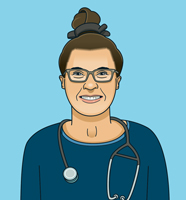
A good nurse, Caroline Cheek, CAS/BA ’09, says, is a careful historian. By connecting the dots of a patient’s medical history, she gives them the best shot at a safe and healthy outcome. The history major often reflects on her own nonlinear path. It’s a reminder that—even in the midst of a global pandemic—Cheek was meant for nursing.
After graduating from AU, the Massachusetts native taught high school, served as a Congressional aide, worked on Mitt Romney’s 2012 presidential campaign, and lobbied for TwinLogic Strategies. But something nagged at her. “I thought, ‘I’m looking for something else, but I don’t quite know what it is,’” Cheek said in late April.
In 2015, she quit her job to attend nursing school at Marymount University. Two years later, the third-generation nurse landed in the George Washington University Hospital emergency department she still calls home.
Seven months into the most draining year in modern history for medical professionals, the registered nurse clinical supervisor remains humbled by her awesome responsibility: advocating for her fellow nurses and the dozens of patients she cares for during each 12-hour shift. “It’s a privilege to give another human being the treatment they need and deserve in the worst moment of their life.”
2019
December 23: Received an air purifier for Christmas from her sister and brother-in-law. “Thinking on it now, it’s like, ‘How did you know?’”
December 30: Discussed the coronavirus with colleagues for the first time. “We all had so many questions. Months later, we still have so many questions.”
2020
January 6: Finished her first official shift after being promoted to RN clinical supervisor at GW’s emergency department.
January 13: Helped implement changes to triage questions about recent travel. “I feel fortunate to work at GW because we have been proactive in a lot of ways.”
February 10: Developed a new routine with her husband, Michael Cheek, CAS/BA ’09. Began placing her scrubs and work-related items in plastic bins outside and showering as soon as she returned from work.
February 17: Navigated “constant change” in the department, including setting up a zone for patients with COVID-19-like symptoms and implementing new safety protocols.
March 2: Started wearing at least one mask all shift, every shift, and sometimes two—a surgical mask on top of an N95.
March 16: Noticed a drop in patients after Mayor Muriel Bowser, SPA/MPP ’00, declared a public health emergency. “But [now] the people that are coming into the emergency department are very sick.”
March 23: Watched nervously as New York’s cases spiked. “The worst part has been waiting for it to get very bad. I think that is one of the things that has been the hardest on staff.”
March 30: Checked in on colleagues as cases in DC grew. “You’re seeing patients in incredible distress. People are very conscious of the fact that patients are dying alone [and] it definitely takes a toll.”
April 6: Joined colleagues in wearing a name tag sticker on top of PPE to help nurses, technicians, and doctors recognize each other in trauma bays.
April 20: Braced herself as DC, Maryland, and Virginia eclipsed 1,000 combined deaths and 25,000 cases. “It started as intermittent, one-off patients in the beginning, and then it just slowly started to rise. By [mid-April], we just assumed that everyone [who came in] had it.”
April 27: Started reading These Truths: A History of the United States by Jill Lepore. “Finding an escape is important. I have chronic depression, so I’ve always had to be vigilant. It took me a long time to say this about having a mental illness: it has made me more empathetic and a better nurse.”
November: Planning (hopefully) to travel to Israel with her great aunt. “The more we can make the choice to look forward, to be hopeful, to find ways to see the incredible things that are happening all around us—like donations of masks and food and clapping for health care workers—the more optimistic we become in fighting this pandemic.”